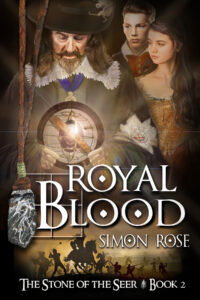Read an Excerpt
 Chapter One
Chapter One
The Streets of London
After they’d left Habingdon and safely arrived in London, Elizabeth had written a letter to Tom’s Uncle John to let him know what had happened. He was still serving with the army in the north but had promised to visit them when he had the chance.
Elizabeth and Sir Henry hadn’t used their London house over the previous few years while the war had been going on, but her sister, Lady Mary Walton, had tended to its upkeep. Mary’s husband, Sir Edward, had died a year earlier but had served in the House of Commons and had been a firm believer in the sovereignty of Parliament. He’d played a leading role in many of the debates prior to the war and Mary had helped to draft many of his speeches and other writings. She was very well informed about the issues of the day and apparently she and Kate had had many discussions about politics when Kate had stayed with her in London. Mary had also helped Kate with her studies, including her Latin and Greek. Mary had looked after the Usborne’s house once Elizabeth and her husband had stopped going there. Now she was often busy with Martha, her ailing mother-in-law, but still spent time at the house with Elizabeth and the children whenever she could.
The Usborne’s small London home was situated quite close to the Thames river, around half a mile from London Bridge. There were no servant’s quarters but the house had four small bedrooms and Elizabeth had insisted that Tom have a room of his own. The smallest room had been used to store some of things that they’d brought from Habingdon, including the medical books and the time viewer. The device had remained disassembled in its box since they’d arrived in the city.
London had been overwhelmingly for Parliament throughout the war and remained so as 1648 came to a close. It was quite chilly in mid-December and Tom and Kate had to wrap up warmly when they ventured out into the street to go to the markets. They each carried a small basket in which to carry home the fruits and vegetables they were going to buy that day.
“I hope I didn’t wake you last night,” said Kate, as they made their way down the cobblestone street after leaving the market stalls. “I had a nightmare and I think I screamed when I woke up.”
“I thought I heard something,” said Tom, “but I was half asleep. I don’t think that your mother heard anything. Was it another unusual dream? Like the ones you told me about at Habingdon?”
She nodded.
“Yes, similar to the others. It’s so strange. Sometimes it just seems as odd as any dreams often are, but then it’s almost as if I’m looking through someone else’s eyes.”
“That does sound strange,” said Tom. “But it’s very hard to make sense of dreams most of the time.”
The narrow streets and alleys flanked by half-timbered buildings were busy that morning, especially around the market stalls. There were also plenty of soldiers in evidence in some parts of the city, since London was more or less now under military occupation.
“The war’s stirred up some extreme feelings,” said Kate, as they passed a noisy tavern. “There are those that feel that everything should change, but others don’t want to go that far. The army leaders had some debates in Putney last year. The Levellers wondered what the ordinary soldiers been fighting for if things were going to stay much the same. After all, some believe that the poorest he that is in England hath a life to live as the greatest he.”
“What?” said Tom.
“It was something that Thomas Rainsborough said at the Putney debates. Aunt Mary told me about it.”
“Who’s Thomas Rainborough?”
“He was one of the leaders of Levellers. He died very recently in the north, killed by the royalists.”
“You certainly know a lot about all this.”
She nodded.
“I’m very interested in what’s going on, but as I said Aunt Mary also told me lots of things when I was staying with her not long ago.”



